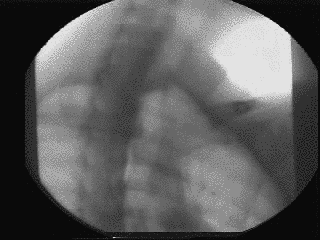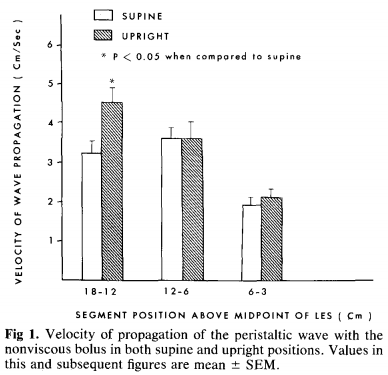How swallowing works
Swallowing is how food and liquid normally move from the mouth to the stomach via the esophagus. It is initiated by a voluntary formation of a bolus (clump) of food and/or liquid and its movement to the rear of the mouth. That triggers an involuntary reaction that leads to the remainder of the swallowing reflex, including occlusion of the pharynx and larynx (protecting your breathing path) and presentation of the esophageal opening. Eventually, the bolus reaches the esophagus and is carried to the stomach via esophageal peristalsis.
The bolus does not fall down the esophagus; it is carried down the esophagus by waves of muscular contractions. The function of peristalsis is to "propel swallowed food or fluid into the stomach". (Patterson, 2006).
This video is a videofluoroscopy of swallowing and esophageal peristalsis. The content is a barium sulfate suspension. (Video from Patterson, 2006.)

Speed of peristalsis
From (Patterson, 2006):
The peristaltic velocity averages about 3 cm/sec in the upper esophagus, then accelerates to about 5 cm/sec in the mid-esophagus, and slows again to approximately 2.5 cm/sec distally.
That speed is affected by the viscosity and body position (among other things).
(Dooley et al., 1988) found that "increasing bolus viscosity [...] elicited a slowing of wave velocity, an increase in wave duration, and a prolongation of lower esophageal sphincter relaxation".
(Dooley et al., 1989) found that "in the upright position, the water bolus caused an increased velocity of propagation in the proximal esophageal segment that was associated with a shortening of lower esophageal sphincter relaxation time and reductions in amplitude and duration of contraction". The proximal esophageal segment is the segment nearest the mouth. In other words, the finding was that the upright position increased the speed of the peristalsis at the beginning of the swallow, not the end. They say, "we can conclude that [for nonviscous liquids] the peristaltic wave travels faster through the more proximal esophagus and slows to its normal rate (or slower) in the distal esophagus with assumption of the upright position."

Figure from (Dooley, 1989)
In their methods, "upright" meant seated and it was compared against supine (laying down).
I couldn't find any studies that showed that the speed of peristalsis differed between sitting and standing subjects.
The claim
Scientifically, drinking while standing lets water hit the lower part of the esophagus strongly
Water doesn't hit any part of the esophagus. It is carried by the esophagus and in contact with it the entire time.
which finally leads to a medical condition called "GERD: GastroEsophageal Reflux Disease"
My review of GERD research (ref, ref, ref, and many others here) doesn't reveal any speculation that standing while drinking has any connection to the onset of GERD.
Summary
While it is possible that the claim (that standing while drinking leads to GERD) is true, the proposed mechanism isn't consistent with our knowledge of how swallowing works and I can't find any studies demonstrating or even speculating about the effect.
References
William G. Patterson. "Esophageal peristalsis". GI Motility online (2006) doi:10.1038/gimo13
C. P. Dooley, B. Schlossmacher, J. E. Valenzuela. "Effects of alterations in bolus viscosity on esophageal peristalsis in humans". American Journal of Physiology - Gastrointestinal and Liver Physiology Published 1 January 1988 Vol. 254 no. 1, G8-G11
C. P. Dooley, B. Schlossmacher, J. E. Valenzuela. "Modulation of esophageal peristalsis by alterations of body position. Effect of bolus viscosity". Digestive Diseases and Sciences. 1989 Nov;34(11):1662-7.


